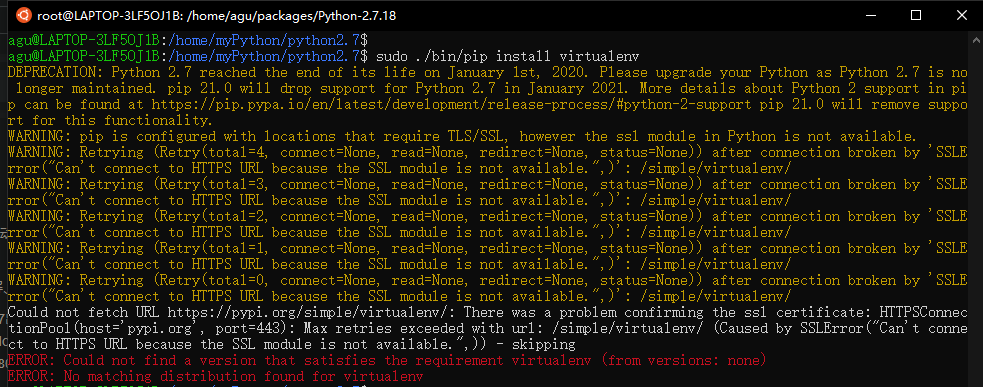
python source code should be compiled with the
SSL=/usr/local/ssl
_ssl _ssl.c \
-DUSE_SSL -I$(SSL)/include -I$(SSL)/include/openssl \
-L$(SSL)/lib -lssl -lcrypto

python source code should be compiled with the
SSL=/usr/local/ssl
_ssl _ssl.c \
-DUSE_SSL -I$(SSL)/include -I$(SSL)/include/openssl \
-L$(SSL)/lib -lssl -lcrypto
When I want to test, NN. Crossentropyloss() is an error, as follows:
>>> x = torch.rand(64, 4)
>>> y = torch.rand(64)
>>> criterion(x, y)
Traceback (most recent call last):
File "<stdin>", line 1, in <module>
File "/Users/rogn/opt/anaconda3/envs/deeplearning/lib/python3.8/site-packages/torch/nn/modules/module.py", line 1051, in _call_impl
return forward_call(*input, **kwargs)
File "/Users/rogn/opt/anaconda3/envs/deeplearning/lib/python3.8/site-packages/torch/nn/modules/loss.py", line 1120, in forward
return F.cross_entropy(input, target, weight=self.weight,
File "/Users/rogn/opt/anaconda3/envs/deeplearning/lib/python3.8/site-packages/torch/nn/functional.py", line 2824, in cross_entropy
return torch._C._nn.cross_entropy_loss(input, target, weight, _Reduction.get_enum(reduction), ignore_index)
RuntimeError: expected scalar type Long but found Float
Reference resources: https://stackoverflow.com/questions/60440292/runtimeerror-expected-scalar-type-long-but-found-float
The reason is that the category target cannot be a floating-point type, but can only be an integer. For example, it belongs to a certain class
So, change the target to an integer
>>> x = torch.rand(64, 4) >>> y = torch.randint(0,4, (64,)) >>> criterion(x, y) tensor(1.4477)
class conv_try(nn.Module):
def __init__(self):
super(conv_try, self).__init__()
# self.conv1 = nn.Conv1d(1, 32, kernel_size=3, stride=2, padding=1)
# self.conv2 = nn.Conv2d(1, 32, kernel_size=3, stride=2, padding=1)
self.encoder = nn.Sequential(
nn.Conv1d(96, 192, kernel_size=3, stride=2, padding=1),
nn.ReLU()
)
def forward(self,x):
x2 = self.encoder(x)
return x2
if __name__ == '__main__':
x =torch.rand(16,96,512)
# print('x1:',x.size())
conv = conv_try(x)
Error Message:
Traceback (most recent call last):
File "C:/Users/12051/Desktop/vae+a/conv2.py", line 23, in <module>
conv = conv_try(x)
TypeError: __init__() takes 1 positional argument but 2 were given
Modified:
if __name__ == '__main__':
x =torch.rand(16,96,512)
# print('x1:',x.size())
conv = conv_try() ####Define a custom class
a = conv(x) ##### and then call
print(a.size())
ModuleNotFoundError: No module named 'pymysql' Solution: Upgrade conda
[root@star/root/anaconda3/bin]’35;conda update conda
[br]root@star/root/anaconda3/bin]’35;conda install pymysql
Question:

Environment: Ubuntu 18.04, electronic invoice PDF document
Cause: the cause of the problem is not clear. The error can only be determined after pdfminer recompiled and installed for Chinese fonts (if any God knows, please let us know)
Solution: modifying the source code is actually a layer of error filtering

Prerequisite: AD has started certificate service (the most important sentence).
import ldap3 SERVER = 'adserver' BASEDN = "DC=example,DC=com" USER = "[email protected]" CURREENTPWD = "adcvQ.SAD" NEWPWD = "adcv.Q.SAD" SEARCHFILTER = '(&(userPrincipalName='+USER+')(objectClass=person))' USER_DN = "" USER_CN = "" ldap_server = ldap3.Server(SERVER, get_info=ldap3.ALL, use_ssl=True) conn = ldap3.Connection(ldap_server, USER, CURREENTPWD, auto_bind=True) conn.start_tls() conn.search(search_base=BASEDN, search_filter=SEARCHFILTER, search_scope=ldap3.SUBTREE, attributes=['cn', 'givenName', 'userPrincipalName'], paged_size=5) # print(conn.response) for entry in conn.response: if entry.get("dn") and entry.get("attributes"): if entry.get("attributes").get("userPrincipalName"): if entry.get("attributes").get("userPrincipalName") == USER: USER_DN = entry.get("dn") USER_CN = entry.get("attributes").get("cn") if USER_DN: res = ldap3.extend.microsoft.modifyPassword.ad_modify_password(conn, USER_DN, NEWPWD, CURREENTPWD, controls=None) if res: print('user %s change password Success.' % USER_CN) else: print('user %s change password Failed.' % USER_CN) else: print("User DN is missing!")
[[email protected] ~]$ https://bootstrap.pypa.io/get-pip.py [[email protected] ~]$ sudo python get-pip.py
The error message “zipimport.ZipImportError: can’t decompress data; zlib not available”
It seems that the zlib library is missing and needs to be installed before execution.
Problem solved
| 1 | [[email protected] ~]$ sudo yum install zlib |
After the installation was completed, we found that it still reported an error, and a Google search revealed that we needed to install zlib-dev
So we install the zlib library again
| 1 | [[email protected] ~]$ sudo yum install zlib* |
This time the installation should be OK, but the result is disappointing, it still gives the same error.
But we have already installed the zlib library, why does it still give us an error?
We need to recompile and install python
Before recompiling, we need to modify the Modules/Setup.dist file in the installation source file to change the
| 1 | #zlib zlibmodule.c -I$(prefix)/include -L$(exec_prefix)/lib -lz |
The comment on this line is removed and becomes
| 1 | zlib zlibmodule.c -I$(prefix)/include -L$(exec_prefix)/lib -lz |
Then compile and install it again (execute the following command in Python’s installation source directory)
| 1 | [[email protected] ~]$ make && make install |
Reinstallation completed
Execute.
| 1 | [[email protected] ~]$ sudo python get-pip.py |
Install pip successfully!
Solution:
Add the following three items to the windows environment variable:
C:\Users\username\Anaconda3
C:\Users\username\Anaconda3\Scripts
C:\Users\username\Anaconda3\Library\bin
Note: if anaconda is not installed in the default directory, you need to replace the C:\Users\username path with the path where you installed anaconda
PS: for Windows environment variable configuration, please refer to: open file explorer, right-click this computer – properties – advanced system settings – environment variables – system variables – path on the left, and add the above three items. If any item is not added, a question will appear
If it still hasn’t been solved
Set anaconda3\library\bin
- libcrypto-1_1-x64.dll
- libssl-1_1-x64.dll
Copy to anaconda3/DLLs#error:underlying buffer has been detached
#Envirment: Docker, Django3.2.5, pyhton3.6
Scenario: the above error occurs every time I execute Python 3 manage.py runserver 0.0.0.0:8000
Finally, the problem was that I introduced the following code into some Python files
sys.stdout = codecs.getwriter('utf-8')(sys.stdout.detach()) # System current default encoding format
However, this code is a habitual way of writing the default output code in Python 2.
Solution: delete all sys.stdout in the .Py file